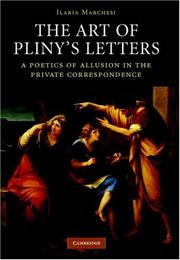| Listing 1 - 2 of 2 |
Sort by
|
Book

ISBN: 9783110245394 3110245396 9783110245400 311024540X 1282911910 9786612911910 9781282911918 6612911913 Year: 2010 Volume: 7 Publisher: Berlin Boston
Abstract | Keywords | Export | Availability | Bookmark
 Loading...
Loading...Choose an application
- Reference Manager
- EndNote
- RefWorks (Direct export to RefWorks)
Questions about how ancient Greek texts establish their authority, reflect on each other, and project their own truths have become central for a wide range of recent critical discourses. In this volume, an influential group of international scholars examines these themes in a variety of poetic and rhetorical genres. The result is a series of striking and original readings from different critical perspectives that display the centrality of these questions for understanding the poetic and rhetorical aims of ancient Greek texts. Characterized by a combination of close attention to philological detail and theoretical sophistication, the essays in this volume make a compelling case for this kind of focused, critically informed dialogue about the nature of ancient textual praxis. Students of classical literature will find a wealth of critical insights and challenging new readings of many familiar texts.
Poésie grecque --- Allusion (rhétorique) --- Rhétorique antique --- Greek poetry --- Allusions in literature. --- Rhetoric, Ancient. --- Histoire et critique --- History and criticism. --- Greek poetry -- History and criticism. --- Allusions in literature --- Rhetoric, Ancient --- Greek & Latin Languages & Literatures --- Languages & Literatures --- History and criticism --- Allusion --- Classical languages --- Greek language --- Greek rhetoric --- Latin language --- Latin rhetoric --- Rhetoric --- E-books --- Ancient rhetoric --- Greek poetry -- History and criticism --- Allusion. --- Rhétorique antique. --- Histoire et critique. --- Poésie grecque --- Rhétorique antique. --- Drama. --- Epic. --- Greek Literature. --- Interpretation. --- Prose.

ISBN: 9780521882279 0521882273 9780511482298 9780521296977 0511387288 9780511388279 0511388276 9780511387289 0511482299 0521296978 1281254967 9786611254964 0511386257 0511384424 0511382618 Year: 2008 Publisher: Cambridge Cambridge university press
Abstract | Keywords | Export | Availability | Bookmark
 Loading...
Loading...Choose an application
- Reference Manager
- EndNote
- RefWorks (Direct export to RefWorks)
In this book on intertextuality in Pliny the Younger, Professor Marchesi invites an alternative reading of Pliny's collection of private epistles: the letters are examined as the product of an authorial strategy controlling both the rhetorical fabric of individual units and their arrangement in the collection. By inserting recognisable fragments of canonical authors into his epistles, Pliny imports into the still fluid practice of letter-writing the principles of composition and organisation that for his contemporaries characterised other writings as literature. Allusions become the occasion for a metapoetic dialogue, especially with the collection's privileged addressee, Tacitus. An active participant in the cultural politics of his time, Pliny entrusts to the letters his views on poetry, oratory and historiography. In defining a model of epistolography alternative to Cicero's and complementing those of Horace, Ovid and Seneca, he also successfully carves a niche for his work in the Roman literary canon.
Allusions in literature. --- Allusions dans la littérature --- Pliny, --- Criticism and interpretation. --- Correspondence --- Criticism, Textual. --- Allusions dans la littérature --- Allusions in literature --- Caius Plinius, --- Gaĭ T︠S︡et︠s︡iliĭ Pliniĭ Sekund, --- Gaj Plinije, --- Kaĭ Pliniĭ T︠S︡et︠s︡iliĭ Vtoroĭ --- Pline, --- Pliniĭ, --- Plinio, --- Plinius Caecilius Secundus, C. --- Plinius Caecilius Secundus, Caius --- Plinius, Caius, --- Gaius Plinius Secundus Minor --- C. Plini Caecili Secundi --- Pline le Jeune --- Plinius de jongere --- Plinius der Jüngere --- Plinius Caecilius Secundus, Gaius --- Arts and Humanities --- History --- Pline le Jeune (0061?-0114?) --- Lettres --- Allusion (rhétorique) --- Intertextualité --- Critique et interprétation
| Listing 1 - 2 of 2 |
Sort by
|

 Search
Search Feedback
Feedback About UniCat
About UniCat  Help
Help News
News